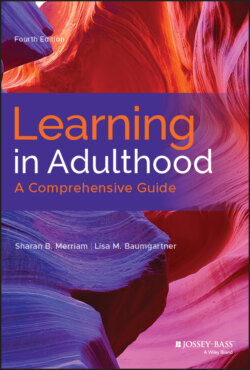Читать книгу Learning in Adulthood - Sharan B. Merriam - Страница 27
Challenges in the Online Learning Environment
ОглавлениеOnline learning is “education that takes place over the Internet” (Stern, n.d., p. 1). As previously noted, this learning can be formal or informal. In this section, we discuss two challenges found in the online learning environment: incivility and the digital divide.
Incivility is an aspect of the digital world. It has been shown to be on the rise in recent years especially within the realm of politics (Kim & Park, 2019) and in informal learning settings such as a Facebook group (Ballantyne, Lowe, & Beddoe, 2017). Researchers surveyed those in a “closed Facebook group established to discuss professional social work issues” (p. 20) and found that participants valued
feeling connected to a wider community of practice… being able to post and share information in issues relevant to the social work community… obtaining access to information [and] links to open access journal articles and other professional development materials. (p. 28)
However, 77% of the respondents also said they were reluctant to discuss or post “their point of view on policy or politics” because they did not want to deal with criticism from the group or they knew others in the group did not share their same sentiments. Participants expressed concerns about online incivility that included personal attacks.
Whether the learning occurs in a formal class or in a nonformal setting such as an online interest group, incivility can be an issue. Incivility can be any behavior that disrupts a harmonious learning environment (Galbraith & Jones, 2010). Acts of incivility include making offensive remarks, refusing to participate in online discussions, challenging the facilitator's credibility, asking for special treatment, making threats, and “inappropriate use of social media for sharing or promotion of academic work” (Galbraith & Jones, 2010; Hopkins et al., 2017, p. 310).
Researchers have examined faculty and student perceptions of online incivility. In a survey that measured “nursing faculty and student perceptions of incivility in an online learning environment” (Clark, Werth, & Ahten, 2012b, p. 150), faculty and students considered online incivility a mild or moderate problem and most frequently listed name calling, making unkind comments about a faculty member, and making “racial, ethnic, sexual or religious slurs” (p. 151) as examples of uncivil behavior. Faculty reported experiencing uncivil behaviors such as students failing to complete assignments in a timely manner, posting terse or vague responses to discussion board questions, and not fulfilling group responsibilities. Students said that the uncivil behaviors of faculty included having unclear expectations about assignments, posting an unclear or vague syllabus, failing to respond to student postings in a timely manner, and failing to provide meaningful feedback on assignments. These results demonstrate the importance of faculty needing to provide “organized, timely and quality feedback” (p. 155) and giving students clear expectations for course interaction.
In a survey of 19 nursing faculty and 152 nursing students, respondents provided several ways to promote civility in online courses including having “clearly defined course and behavioral expectations, norms, and consequences” (Clark, Ahten, & Werth, 2012a, p. 193), faculty being role models and setting a positive example for online behavior, addressing uncivil behavior immediately and holding individuals accountable for their behavior and “encouraging and rewarding civility” (p. 195). Students added that having an orientation about civility would be helpful. Based on these findings the authors recommended that “faculty and students work together to co-create and implement behavioral norms in the [online learning environment]” (p. 196). This conversation can begin by listing behaviors to emulate and to avoid. Discussions about how often members will access the discussion boards and actions for violating the norms should be discussed (Clark et al., 2012a, 2012b).
Galbraith and Jones (2010) have several recommendations for instructors when responding to incivility. They suggest instructors remain calm, respond to the issue immediately, do not waiver on the consequences for the uncivil behavior, and act on the consequences quickly. Providing clear expectations regarding response time to e-mails and grading assignments is important as incivility can occur when learners do not know these expectations.
Fostering emotional intelligence may curb online incivility. Emotional intelligence includes the capacities of “emotional self-control, conflict management, teamwork, cultural awareness, and inspirational leadership (Boyatzis & Saatcioglu, 2008)” (Majeski, Stover, Valais, & Ronch, 2017, p. 135). (See Chapter 14 for more on emotional intelligence.) In designing the course, the instructor can “model emotional intelligence” (p. 136) through having clear guidelines for discussion that focus on creating a safe environment that promotes respect for all. Instructors can create activities that foster emotional intelligence. Majeski et al. (2017) give an example of an activity used in a “Aging, People, Policy, and Management” undergraduate course where students listened to a narrative of Eva Kor, a Holocaust survivor, to see how that event shaped her life course and revealed Eva's resilience. Encouraging learners “to be mindful of the process of their own and other learners' ways of thinking about issues rather than the outcomes of thinking such as opinions” is another way to foster emotional intelligence (p. 138).
